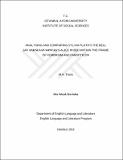DSpace Repository
ANALYSING AND COMPARING SYLVIA PLATH'S THE BELL JAR AND SUSAN SONTAG’S ALICE IN BED WITHIN THE FRAME OF FEMINISIM AND PANOPTICON
JavaScript is disabled for your browser. Some features of this site may not work without it.
| dc.contributor.author | Selçuk Kurtuluş, Sıla
|
|
| dc.date.accessioned | 2019-05-24T07:43:18Z | |
| dc.date.available | 2019-05-24T07:43:18Z | |
| dc.date.issued | 2013 | |
| dc.identifier.uri | http://hdl.handle.net/11547/2100 | |
| dc.description.abstract | Tarih boyunca, erkek ve kadının konumu arasında önemli bir fark vardır. Erkeklerin dış dünyayla uğraşması beklenirken, kadınlar ideal anne, ev hanımı gibi bazı sosyal rollerle meşgul olması beklenen kişiler olmaktadır. Özellikle, yazmak için entelektüel güce sahip olan kadınlar kendi yaratıcı akılları ile toplum tarafından kabul edilme mecburiyeti hissiyatı arasında ikilem yaşamaktadırlar. Edebiyat uğruna, bu kadınlar zihinsel rahatsızlık ve depresyondan mustarip olmaktadır. Sonunda da bu kadınlar arasında intihar eğilimi ortaya çıkmaktadır. Bu tez çalışması kadınların ne kadar yaratıcı akıllara sahip olursa olsun toplumsal ve ailevi kısıtlamaların onların gelecek planları üzerindeki etkisini göstermeyi amaçlamaktadır. Bu çalışma bu konuyu Sylvia Plath’ın The Bell Jar ve Susan Sontag’ın Alice in Bed eserlerini inceleyerek ele alacaktır. Bu kaynaklar Feminizm ve Foucault’nun Panopticon kuramları çerçevesinde incelenirken bu çalışmanın ana kaynakları olacaklardır. Her iki eser de ataerkil toplumda kadının konumunu sorgulamaktadır. Romandaki ve oyundaki ana karakterler baskın güçler yüzünden hissettikleri baskıyı açıkça göstermektedirler. Bu karakterler, ataerkil sistemin oluşturduğu gücün örnekleridir ve bu sistem yüzünden kadınların başarı alanlarının kısıtlanmasını açıkça göstermektedirler. Kendilerini kaybolmuş hissederler ve depresyondan mustarip olurlar, böylece bu karakterlerin intihar etme eğilimleri vardır. Bu nedenle, bu tez toplumun kadınların arzuları ve kimlikleri üzerindeki baskısını yansıtacaktır ve kadınlarda sonrasında psikolojik problemlere sebep olan kadına karşı uygulanan çifte standarttı gösterecektir. | tr_TR |
| dc.language.iso | tr | tr_TR |
| dc.publisher | ISTANBUL AYDIN UNIVERSITY INSTITUTE OF SOCIAL SCIENCES | tr_TR |
| dc.subject | Feminizm | tr_TR |
| dc.subject | Panopticon | tr_TR |
| dc.subject | Kadının Baskılanması | tr_TR |
| dc.subject | Psikolojik Problemler | tr_TR |
| dc.subject | İntihar Eğilimi | tr_TR |
| dc.subject | Feminism | tr_TR |
| dc.subject | Panopticon | tr_TR |
| dc.subject | Oppression of Women | tr_TR |
| dc.subject | Psychological Problems | tr_TR |
| dc.subject | Suicidality | tr_TR |
| dc.title | ANALYSING AND COMPARING SYLVIA PLATH'S THE BELL JAR AND SUSAN SONTAG’S ALICE IN BED WITHIN THE FRAME OF FEMINISIM AND PANOPTICON | tr_TR |
| dc.type | Thesis | tr_TR |
| dc.description.abstractol | Throughout the history, there is a crucial difference between men’s and women’s position. Women have been the ones who are expected to engage in some social roles such as being an ideal mother, housewife while men have been expected to deal with outer world. Especially, women who have an intellectual power to write have had paradox between their creative minds and feeling of obligation to be accepted by society. For the sake of literature, these women have suffered from mental illness and depression. At the end, suicidality emerges among these women. This thesis study aims at demonstrating how social and familial constraints have an impact on the future plans of women no matter how they have creative minds.This study will handle this issue by analyzing Sylvia Plath’s novel, The Bell Jar, and Susan Sontag’s play, Alice in Bed. These works will be the main sources of this thesis while they are being analyzed within the frame of Feminism and Foucault’s notion of Panopticon. Both of the works question the position of women in patriarchal society. The protagonists in the novel and the play clearly demonstrate the oppression they feel because of dominant forces. These characters are the examples of the power that patriarchal system creates, and they clearly show the limitation of women’s scopes of success because of this system. They feel engulfed, and they suffer from depression, so they have a tendency towards committing suicide. Hence, this thesis will reflect society’s pressure on women’s desires and their identity, and it will demonstrate the double standards applied to women which later gives rise to psychological problems for women. | tr_TR |
| dc.publisher.firstpagenumber | 1 | tr_TR |
| dc.publisher.lastpagenumber | 71 | tr_TR |
Files in this item
This item appears in the following Collection(s)
-
Tezler -- Thesis [3470]
